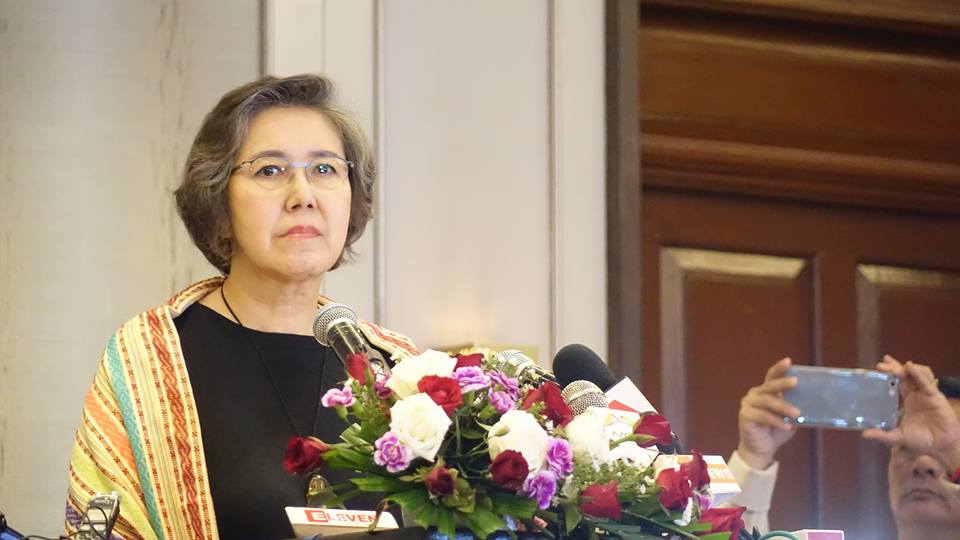UN human rights envoy Yanghee Lee offered stern words for the Burmese government on Friday evening, urging it to reconsider its refusal to issue visas to a UN fact-finding mission tasked with probing alleged human rights abuses in Arakan State and elsewhere in Burma.
Concluding a 12-day visit to the country, the UN special rapporteur expressed frustration at government restrictions placed on her team, denying her access to parts of northern Shan State, Arakan State and Karen State. Improving access for journalists, activists and rights groups was the theme of the night as she wrapped up her trip with a press conference in Rangoon, where she took the opportunity to point out that these groups and the UN fact-finding mission continue to be hindered by these government constraints.
“The developments in recent months are enough evidence for why an independent international mechanism, an international body, should have access to verify, collect data and testimonies on what really happened,” Lee said, referring to the deadly 9 October attacks on Burmese police posts in northern Arakan State — blamed on Muslim Rohingya militants — and heavy-handed security response in the months that followed.
The establishment of an independent mission to look into alleged human rights abuses by Burmese security forces against the Rohingya population was adopted in March and is supported by the European Union and countries such as the United States. However, Aung San Suu Kyi’s government has continued to reject the UN resolution laying out the fact-finding mandate.
“I understand the new government wishes to normalise its relations with the United Nations, including not having special mechanisms attached to it. Before these ‘special mechanisms’ can be dismantled, Myanmar must first transition into a country that deserves less attention and scrutiny,” said Lee
Asked for a second time during a Q&A that followed her end of mission statement whether there was a “Plan B” for the fact-finding commission if they continue to be denied access to Burma, Lee did not answer directly, saying: “I would strongly urge the government to change its mind, to allow the mission to come in and collect the facts themselves.”
Over the course of her sixth visit to Burma since she assumed the special rapporteur role, Lee met with officials at the state and Union level and called for concrete actions, including investigating all alleged human rights violations. She was not, however, able to meet with Commander-in-Chief Senior-General Min Aung Hlaing or other representatives from the Ministry of Defence, a notable gap on her roster of sit-downs given that the military has faced the brunt of accusations of human rights abuses for years.
Although there were reports of progress on the government’s implementation of the Rakhine Advisory Commission’s interim recommendations, such as the closure of IDP camps, there is still no uniform resettlement practices, remarked Lee.
“The general situation for the Rohingya has hardly improved since my last visit in January,” she said.
On the other side of the Buddhist-Muslim divide in Arakan State, Lee said “members of the Rakhine [Arakanese Buddhist] community expressed to me their sadness at the current situation, their belief that the problems were caused by hardliners in both communities or even the government, and asked for the international community to be reminded that the Rakhine community as a whole should not be judged for the actions of its most extreme members.”
Situation in northern Shan continues to deteriorate
Although the UN envoy was blocked from visiting areas outside of Lashio in northern Shan State, her team was still able to meet with members of the state government and civil society actors. Reports of killings, torture and even the use of human shields by the Tatmadaw were brought to her attention.
“I am concerned to hear from groups working on the ground they see more conflict, more cases of alleged human rights violations by different parties to the conflict and inadequate assistance for civilians,” she told the gathered media.
[related]
Lee said she requested to visit Hsipaw Prison — where three journalists arrested last month on controversial “unlawful association” grounds are currently being detained — but was denied, with the special rapporteur pointing out an irony: “Despite Hsipaw being a tourist destination and frequented by foreigners, I was not allowed to go there.
She ended her remarks Friday by calling on the government to quit old tactics used by the previous military regime, such as surveillance and restrictions on access, and urging for more international actors to support the country’s democratic transition. ASEAN was singled out, with Lee calling for the regional bloc to “take a non-indifference” stance, in an apparent reference to the principle of “non-interference” that the 10-member association holds dear.



